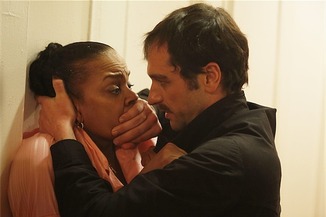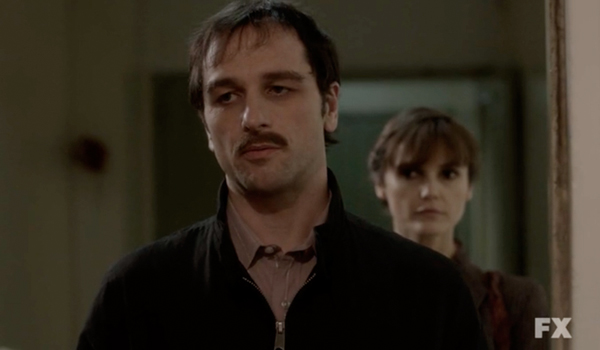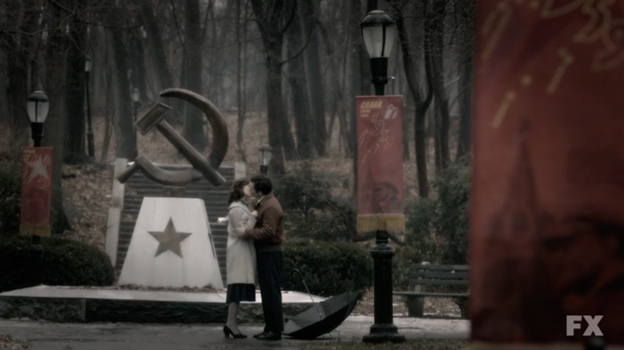 Sam and I are back — a little late this time — to talk about Episode 2 of The Americans, titled “The Clock.” The consensus? Lower expectations make for a more enjoyable viewing experience. (I guess we should all know that by now given the inexplicable long-term popularity of Two and a Half Men.)
Sam and I are back — a little late this time — to talk about Episode 2 of The Americans, titled “The Clock.” The consensus? Lower expectations make for a more enjoyable viewing experience. (I guess we should all know that by now given the inexplicable long-term popularity of Two and a Half Men.)
Sam: At first glance, this week’s episode wasn’t that bad. I wasn’t impressed, but I wasn’t supremely disappointed either. I must be managing my expectations well.
Stan Beeman, though. I just find him annoying. First of all, they found caviar at some stereo store. Is it just me or does that just seem too convenient a storyline? And after pocketing that caviar, why does Stan feel the need to take it to Philip’s house that night? Is his gut telling him that caviar will make Philip admit he’s a KGB officer?
Interesting development at the FBI office though. Beeman takes a congratulatory phone call, and I noticed Amador’s face contort all of a sudden. Might this have been The Americans‘ subtle attempt to hint at race-relations in the workplace in the early 80s? Or this might’ve just been another tangential sequence with no direction (like the child predator from the first episode).
Also, in this episode, Elizabeth just seemed like a totally different character to me. Gone was the steely, nationalistic resolve from last week. Instead, perhaps fueled by her conversations with Philip (which still would be strange, given what we’d seen of their seemingly complicated relationship from last week), she wants to spend more time as a mother. I don’t know. I said it last week, and I’ll say it again. I find her character development sporadic and weak at best. Who randomly wakes up their daughter in the middle of the night to pierce their ears? Bizarre.
Your take?
Jay: Your last point cracked me up: there really is very little explanation for Elizabeth barging in on her sleeping daughter to pierce her ears. And on a similar note, I really don’t know why they insert gratuitous scenes like Phil watching over his sleeping son with hands folded. What is that scene supposed to accomplish? Let us know that, despite nearly suffocating an innocent guy earlier, he’s still a loving dad? I mean, great?!
The funny thing is, I know exactly what you mean about managing expectations: a big part of the reason I didn’t see this episode until today is because I was really busy, but the other part is that I just wasn’t that excited about it. So when I finally did watch it, my expectations were low enough that it allowed me to actually enjoy the episode much, much more than I did the pilot.
And I have to say, things were better this time around. Elizabeth, like you said, was much less dogmatic and more of a real person. Stan’s workplace dynamics are starting to shape up — although, again, we don’t know exactly what that look on Amador’s face meant yet, other than what seemed to be office politics (Stan taking the credit for other people’s hard work). Even the scene with Stan in Phil’s kitchen wasn’t as awful as it could have been. Granted, the whole caviar side-plot is a bit strange, but it seemed conceivable that Stan came over just to be friendly. He seems to be a bit of a loner, even with a family.
I’m also curious to see how the story with the newly recruited Russian caviar thief works out. I have to admit, I didn’t really pay close attention during Stan’s scene with her, so I’m not entirely sure what the racket was that she had gotten herself involved in — stealing caviar from an embassy and buying stereos with it? did I hear that right? — but I’m looking forward to seeing what she ends up doing.
My biggest complaint, weirdly enough, is about the girl Phil’s stringing along in his roleplaying as a Swedish intelligence officer: why are her lines so cheesy? No one talks like that, not even back in the 1980s. At least I certainly hope not.
Do you see any themes shaping up? Anything to get you more engaged? I have to admit that I’m somewhat less down on the show now, even if I remain wary.
 Sam: I had forgotten about Philip and the whole Swedish intelligence officer thing! You know, as part of my lowered expectations mantra, I think I just kind of approached that one with an “eh” reaction.
Sam: I had forgotten about Philip and the whole Swedish intelligence officer thing! You know, as part of my lowered expectations mantra, I think I just kind of approached that one with an “eh” reaction.
I do think you’re right, though, that such an approach allows the episode to do better this time around. You might be right about Stan just being friendly or not having much of a family life. Or perhaps he just felt bad for breaking into the Jennings’ garage.
Theme-wise, so far, I feel like we’re going to see a lot of family influence on the main characters’ actions and inactions. That seems to be a major theme of the series — that you have these covert spies who are supposed to blend in by having a normal family, etc. but have to balance a dangerous hidden life.
As for anything to get me more engaged, I’m honestly not sure. I can’t help wondering if some sort of Homeland-like twist where one of the main characters becomes a double agent might not make me more interested. But then it’d just become an even more second-rate Homeland ripoff. So I’ll just continue managing my expectations and enjoying more scenes of confiscated caviar being consumed. That’s it. I enjoy food, so perhaps introducing more good food would be a nice development (I’m only being somewhat facetious on this point).
What about you? What would you do to make this better?
Jay: I’m with you on the family aspect: I think this will continue to play a large role on the show. In fact, I think I read an interview with the creator, who said that the show was really about marriage and family, and that the spying was almost secondary (paraphrasing hugely here).
The Americans is in a somewhat strange position: it’s arriving on the heels of another very popular spy show, and yet there may actually be an opening for this one too just by virtue of the fact that Homeland went almost completely off the rails at various times during Season 2. And yet anything The Americans does will — at least in our minds, quite obviously — be compared against Homeland.
I think they need to make sure they take The Americans in a different direction. Obviously, they can’t avoid certain similarities: double agents, covert operations, and so on are all necessary staples of the spy genre, but one advantage The Americans has is its historical setting: the 1980s and the beginning of Ronald Reagan’s administration. It seems to me that they’re a bit more willing to “get political” (given the multiple references to Reagan being crazy and whatnot) than Homeland was, possibly simply due to the benefit of hindsight (people don’t always get as angry discussing the politics of thirty years ago than they would about contemporary issues like terrorism). That, and the look exchanged between Stan and his Number 2 make me think the show could edge in a direction that establishes itself as social commentary. I say “could” because, so far, these seem like mostly irrelevant blips that don’t connect to any broader themes, but that may be just because we’ve seen only two episodes. I guess we’ll find out.


 Sam and I are back — a little late this time — to talk about Episode 2 of The Americans, titled “The Clock.” The consensus? Lower expectations make for a more enjoyable viewing experience. (I guess we should all know that by now given the inexplicable long-term popularity of Two and a Half Men.)
Sam and I are back — a little late this time — to talk about Episode 2 of The Americans, titled “The Clock.” The consensus? Lower expectations make for a more enjoyable viewing experience. (I guess we should all know that by now given the inexplicable long-term popularity of Two and a Half Men.) Sam: I had forgotten about Philip and the whole Swedish intelligence officer thing! You know, as part of my lowered expectations mantra, I think I just kind of approached that one with an “eh” reaction.
Sam: I had forgotten about Philip and the whole Swedish intelligence officer thing! You know, as part of my lowered expectations mantra, I think I just kind of approached that one with an “eh” reaction.